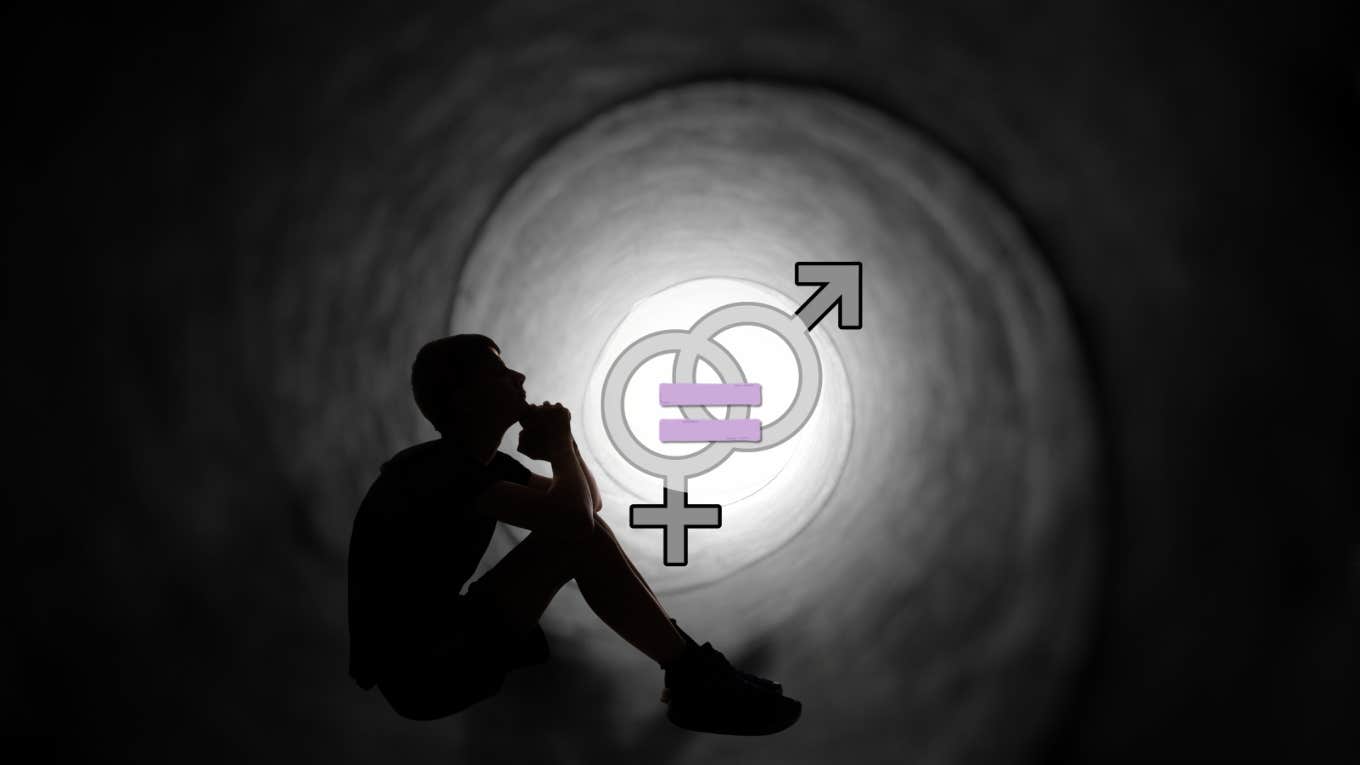Mom Relieved After Her Son Comes Out To Her As A 'Demiboy' — 'I'm Flattered That He Trusts Me'
Her son revealed he found himself, just not in the way she was expecting.
 sdominick | Canva
sdominick | Canva When my sixteen-year-old son Holden asked me to join him at his next weekly therapy session, I was expecting him to announce he was gay. What else would be such a non-emergency that he could wait a week to tell me, but that he needed to talk about in the safe space of his therapist’s office? Autism, apparently.
Holden has been in therapy since middle school, but it’s only been in the past year that he started reflecting on his identity in the more serious way of an adolescent.
We knew he spent hours online every day, but we figured his Internet content was restricted to video games and information about those games. It turns out he was self-diagnosing — and according to the professional evaluation that we initiated shortly after his big reveal, he was spot on.
It also turns out that Holden was finding himself in a myriad of ways, and I wasn’t too far off with my hunch. Holden’s identity does fall under the LGBTQ umbrella, but not in the way I originally suspected.
Rather, my son came out to me as a demiboy.
With our younger two daughters at Grandma’s for the night, Jack and I thought it an opportune time to take our teenagers out to a quieter-than-normal dinner at our family’s favorite Mexican restaurant. Jack sat next to me in the booth; Holden and our fourteen-year-old daughter Catherine sat across from us.
Over chips and salsa, I urged my teens to choose new winter coats from the Columbia website, which I presented to them on my phone.
Catherine picked out a white puffer jacket within mere minutes. She’s decisive like that. Holden, meanwhile, scrunched up his face as he clicked around. “Don’t they have any gender-neutral options?” he asked.
I’d seen that some stores like Old Navy had been offering this in recent months. Our fifth-grade daughter was all about gender-neutral sweatpants and hoodies, as was Holden. They certainly looked comfortable, so who could blame them? But I wasn’t sure about Columbia, and I sensed that his inquiry went deeper than sensory comforts.
“Let me see,” I said, holding out my hand for my phone. I made sure to keep my voice casual when I asked, “So why do you want a gender-neutral coat?” I recently read The Emotional Lives of Teenagers and confirmed that teens don’t like it when their parents make a big deal out of pretty much anything.
But Holden seemed pleased that I’d asked as he tried to hide his smile. That’s one of his signature moves, and it’s as close to expressing joy as his personal affect will allow.
“Well, I would say that I identify more as a demiboy,” he said.
So many thoughts ran through my mind as I sat across from my son — demison? — in that booth.
I knew it was something like that! Ooooh, he’s sharing personal info with me! Maybe this explains the long hair. I kept my cool, though, because I knew that if I made a big deal about any of this, he wouldn’t share more. “Oh, okay, thank you for sharing that with me. That’s important,” I said.
I’m sure that Holden knew we’d be accepting of his identity; we don’t hide my bisexuality from our kids.
Catherine has been openly queer for some time now, also without an elaborate announcement of any sort. Plus, quite a few transgender teens frequent my school library; it’s their “safe space.”
I’ve also read my fair share of young adult LGBTQIA+ literature. A few years back, I read the young adult novel Felix Ever After by Kacin Callendar, in which the book’s titular character transitioned from female to male as a younger teen.
But at age seventeen, Holden still didn’t feel quite right identifying as a male, and he set off on the Internet for a more accurate label. He lands on the term “demiboy” to describe someone who identifies on the gender spectrum somewhere between male and non-binary, and that’s what ultimately felt best for him.
Jack had never heard that term, though, so he asked Holden for clarification on “demiboy.” Holden’s answer matched Felix’s definition to a T. Jack and I read all the same parenting books so that we could discuss the ideas and support each other, and I could also see him trying to play things cool. “So what are your pronouns?” Jack asked.
Holden looked off to the side as he answered. He often avoids eye contact, which we now see as relating to autism rather than rudeness, insecurity, or sly behavior. “I’m still OK with he. Or they. Either one.”
I couldn’t resist asking my follow-up question. “So…I’m curious…what gender are you attracted to?” Yes, fine, I’m a nosy middle-aged mother.
Holden shrugged in a way that made me think he either hadn’t given this much thought or didn’t want to discuss it further. “I guess females,” he said. Honestly, I was shocked that he had a preference at all. Based on his immense time playing Mario video games, I wasn’t hopeful for romance in Holden’s near future. I suppose there was always marching band; it certainly worked for me and Jack’s meet-cute…
But I didn’t push that issue any further. That seemed another topic altogether, and perhaps not fully related to his gender identity. I didn’t want to taint his announcement by pushing him too hard; I wanted my kid to know that I accepted him wholeheartedly.
With that, we moved on to choosing a winter coat that was gender-neutral — landing on a black puffer jacket from the men’s section, because Columbia does not have any gender-neutral options — just before the waiter brought out our dinners.
I’ll be honest — I wasn’t expecting Holden to announce that he was identifying as a demiboy.
I always knew that Holden wasn’t “the norm,” whatever that is, but my hunch that Holden wasn’t fitting in because of his sexuality was my own bias.
I’m a lesbian-leaning bisexual who found and fell in love with an exceptional man. Until I presented as straight and started parading around town on Jack’s arm, I’m pretty sure that I just presented as awkward, weird, a little bit of an outsider.
When Holden suggested that he was autistic, I dove into the research. My findings, concerning Holden, can best be summed up by one simple word: duh. I felt guilty that I hadn’t seen this in him before, but I consoled myself that the psychiatrists he’d seen these past ten years had also missed the mark. I also realized that much of Holden’s hereditary condition was likely inherited from yours truly.
When Holden revealed his demiboy identity, I had thought it was just “one more thing” to add to his list. But the more I research autism, the more I see how all of his identity is intertwined.
Several recent studies have confirmed that there’s an association between gender diversity and autism. Devon Price, in their book Unmasking Autism, refers to the correlation as “autigender,” in which Autistic people experience gender differently than neurotypical people. Holden tells me that’s just common sense.
I like these conversations with my son — the insights I’m finally getting into his identity.
I like seeing him decorate his gingerbread man Christmas cookies with the trans flag colors. I like seeing him happy and proud to be himself.
 Anderson Smith Arboleda | Shutterstock
Anderson Smith Arboleda | Shutterstock
Holden is light years ahead of me in terms of reflecting on his identity, as a teenager rather than waiting until his mid-thirties and forties. I applaud his self-awareness and his fortitude in voicing his findings.
I’m flattered that he trusts me, Jack, and our daughters with this information. But I know that plenty of others will roll their eyes at my kid’s label.
I’ve already had raised eyebrows and “going through a phase” comments from coworkers. Holden has shrugged off my request to share his gender identity with my Catholic parents, who he knows won’t be accepting. He asked me to order him thigh-high striped “femboy” socks, but he still hasn’t worn them out of the house.
Holden and I both know that not everyone in our conservative little corner of the Midwest will be as accepting as our family, but we’re taking it one day at a time. He’s still exploring who he is and how he wants to express himself, and that’s age-appropriate and A-OK. It’s better than OK — it’s exciting.
A few months later, I took Holden and Catherine to their annual scoliosis doctor appointments together (yes, we have a lot going on over here). I looked up at Holden as I filled out the forms. “Do I check male or non-binary?”
He considered this for a moment. “You can just put male,” he said, and so I did.
At lunch afterward, I inquired about Holden’s gender to see if there was an update. Felix Ever After taught me that how a person identifies their gender can be fluid, especially for teens who are still figuring themselves out.
“Well, I think gender is just a social construct,” Holden told me in his dry way of speaking. “I don’t feel very strongly male or female.”
My son's appearance has changed in recent years, perhaps as a means of expressing that feeling.
He’s small — only five feet tall — but he says often that he doesn’t mind being short. He’s grown his hair out to his shoulders, and it waves up in a naturally pretty way. He didn’t wear much deodorant until I suggested that he might prefer the Dove brand I wear over the Old Spice brand that Jack wears.
He admits that he still checks the male boxes to keep things simple; he’s not the type of kid to take a stand or stand out.
As we drove home from the appointment and lunch outing, I opened up to my teens about my own non-normative identity as a bisexual woman.
I told them about how my own mother’s prejudice had made me shy about my sexuality. I told them that I loved them for being themselves. I told them I’d support them however I could — perhaps we could look for an LGBTQ group at their school?
In typical teenage fashion, they acted like they didn’t care.
“Most of my friends are LGBT,” Catherine said.
“I’ve got the Internet,” said Holden.
Maybe this generation is different, maybe they’re headed down a pristine path that queer trailblazers of the past could only dream of.
Or maybe they’ll all rot their brains and ruin their lives on social media. Who knows. Except that I’m so uncool. So middle-aged millennial. So "cringe" in my declarations of motherly love. Oh, well. I can accept that, too.
Anna Eliza Rose is a writer, librarian, and mom of four. She frequently posts her essays to Medium and Substack and is currently working on a follow-up to her memoir.

